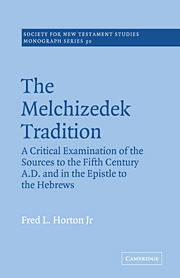 The Melchizedek Tradition
The Melchizedek Tradition Published online by Cambridge University Press: 16 October 2009
There are at present only four published sources for Melchizedek within Gnostic thought. It is my understanding that more material will be forthcoming from the Chenoboskion documents, but within the documents already published from that find there is no mention at all of Melchizedek. The four sources which are available to us at present are (a) Kahle's Fragment 52, (b) the Pistis Sophia, Books i–iii, (c) the Pistis Sophia, Book iv, and (d) the Second Book of leû. I shall discuss each of these in turn and present a short summary at the end of this chapter.
FRAGMENT 52
This fragment was among those discovered by Sir Flinders Petrie in 1907 at Deir El-Bala'izah and which became the property of the Bodleian Library shortly thereafter. It has been published twice, once by W. E. Crum and once by Paul Kahle who edited and published the entire collection of texts made by Sir Flinders Petrie. Kahle informs us that this text is written in uncials of the fourth century A.D. but that it shows some archaisms in grammar. The text translated below is taken from a text essentially like that presented by Kahle with one or two minor changes and some conjectures as to the proper way of filling some of the lacunae.
Text 52 is a translation of an originally Greek work. For many of the Greek words used there are perfectly adequate Coptic words.
To save this book to your Kindle, first ensure [email protected] is added to your Approved Personal Document E-mail List under your Personal Document Settings on the Manage Your Content and Devices page of your Amazon account. Then enter the ‘name’ part of your Kindle email address below. Find out more about saving to your Kindle.
Note you can select to save to either the @free.kindle.com or @kindle.com variations. ‘@free.kindle.com’ emails are free but can only be saved to your device when it is connected to wi-fi. ‘@kindle.com’ emails can be delivered even when you are not connected to wi-fi, but note that service fees apply.
Find out more about the Kindle Personal Document Service.
To save content items to your account, please confirm that you agree to abide by our usage policies. If this is the first time you use this feature, you will be asked to authorise Cambridge Core to connect with your account. Find out more about saving content to Dropbox.
To save content items to your account, please confirm that you agree to abide by our usage policies. If this is the first time you use this feature, you will be asked to authorise Cambridge Core to connect with your account. Find out more about saving content to Google Drive.